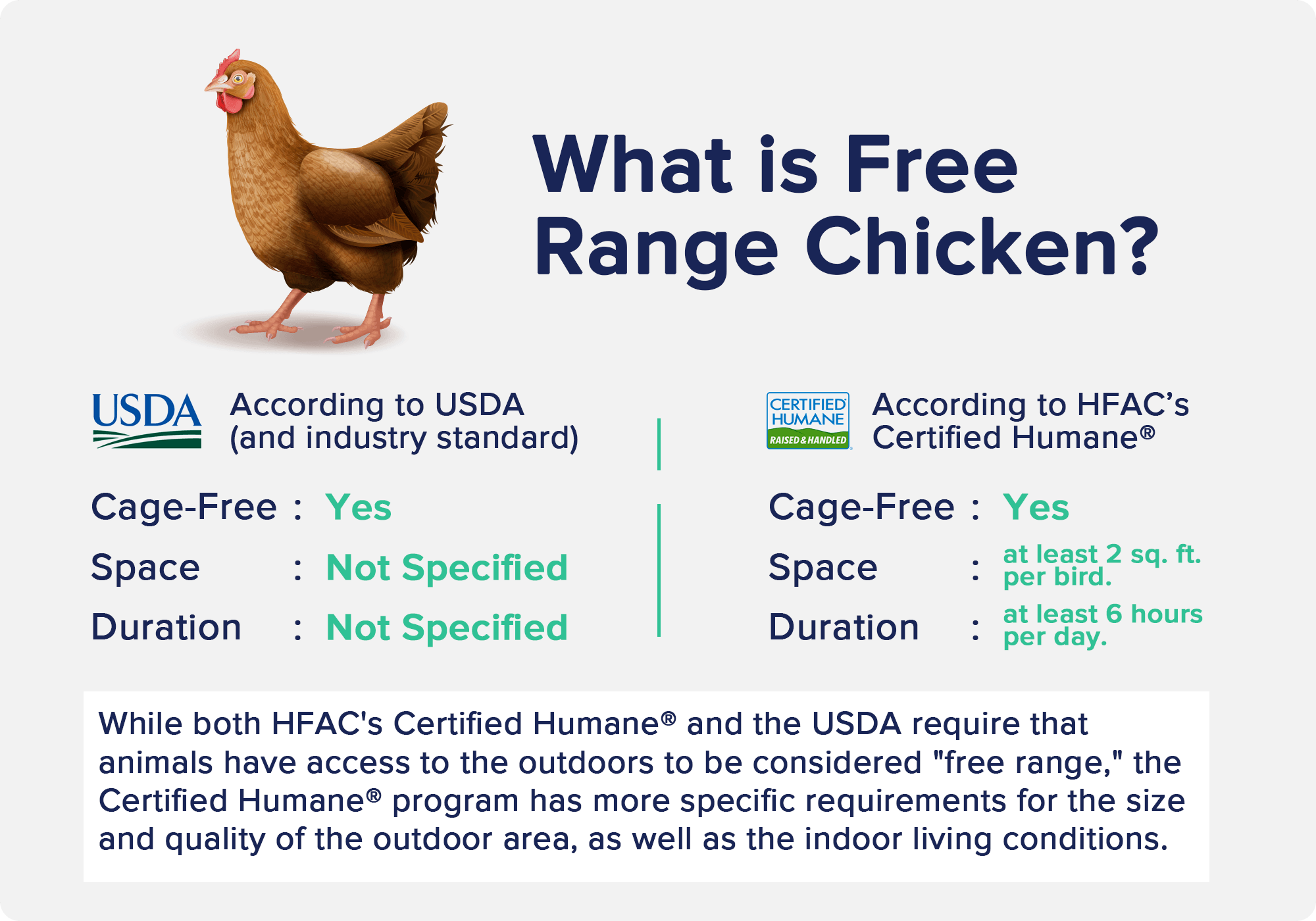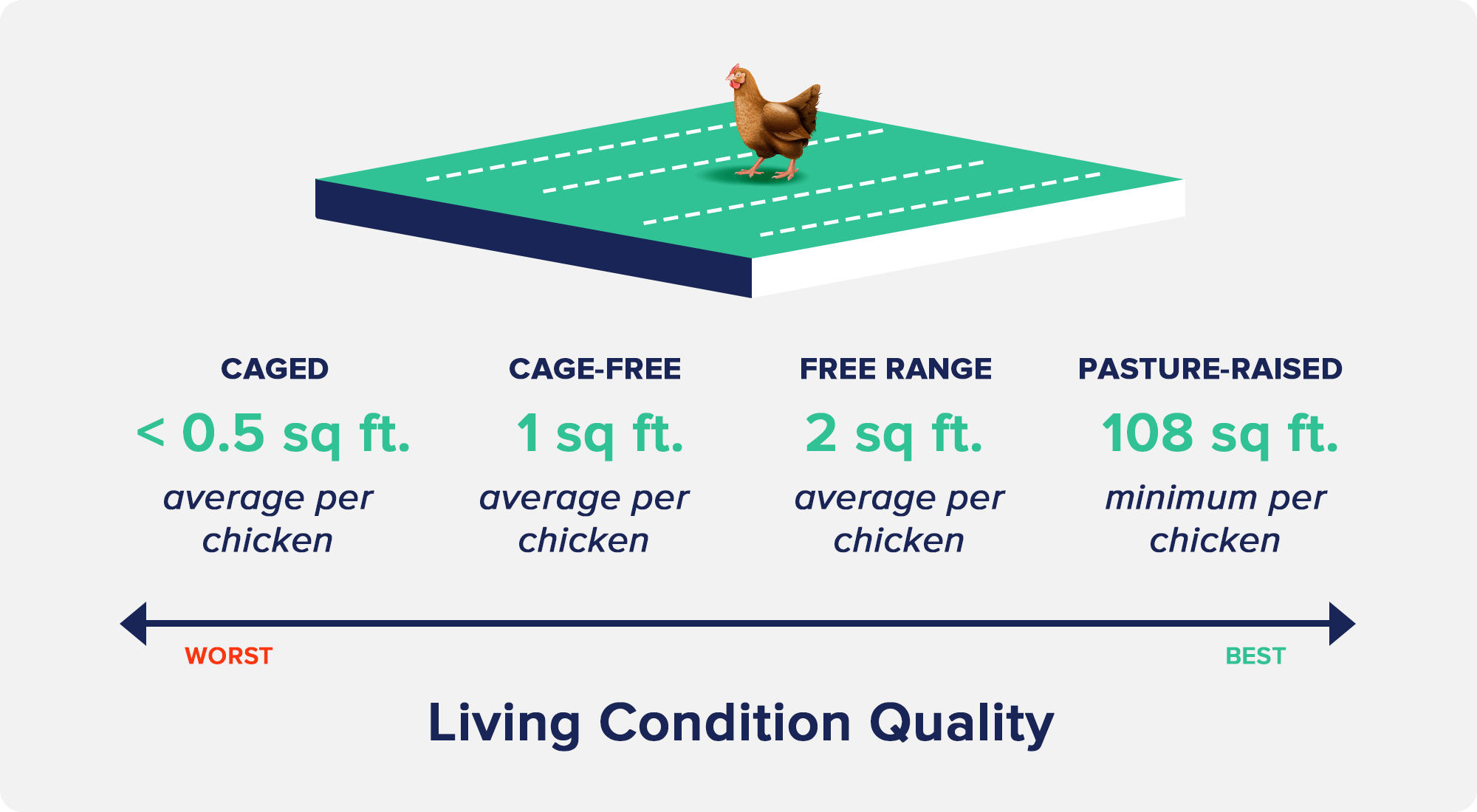Try our favorite, clean protein powder: See our top pick →
Try our favorite, clean protein powder: See our top pick →
This post contains links through which we may earn a small commission should you make a purchase from a brand. This in no way affects our ability to objectively critique the products and brands we review.
Evidence Based Research To fulfill our commitment to bringing our audience accurate and insightful content, our expert writers and medical reviewers rely on carefully curated research.
Read Our Editorial Policy
The abundant terminology you see on chicken packages or egg cartons at the store can certainly be confusing—from cage-free to free-range to pasture-raised, it can be hard to know which one is best.
Although “free range” sounds idyllic and invokes the pastoral image of chickens roaming freely and grazing the day away, this is unfortunately not always the case.
In this article, learn more about what defines free-range chicken, the benefits and downsides of free-range chicken, and what type of chicken might be a better choice.
The term “free range,” as defined by the USDA, is that chickens must have “outdoor access” or “access to the outdoors.”
However, this is open to some interpretation.
For example, this can mean that there is a tiny “pop hole” that technically allows access to the outdoors—but in a crowded henhouse, not all chickens would be able to access it.
The USDA’s rule also does not specify how long the chickens should have outdoor access—meaning, popping open a small door for just minutes would legally suffice.
Although some farms do things right, many large-scale chicken or egg producers will simply install a small door or open window that leads to paved ground—no idyllic grazing farm life here.
These chickens—or their eggs—can still legally be labeled “free-range” despite the not-so-free environment.
However, free-range chickens will always be cage-free, which is a plus.
This is not to say that all large-scale farmers are leaning on these loopholes, as many do allow their chickens to have real roaming access to the outdoors.
To take “free-range” a step further, HFAC’s (Humane Farm Animal Care) Certified Humane® Free Range classification adds a space requirement inside the henhouse, with a minimum of 2 square feet per bird.
Plus, Certified Humane® Free Range hens must be allowed outdoors for at least six hours per day (weather permitting)—a vast improvement over the USDA’s meager requirements.

Although we talked about some potential downsides of free range chicken—especially if they are just going by the USDA’s definitions—buying or consuming free range chicken does have some benefits, especially when compared to conventionally raised chicken.
Conventionally raised chickens are kept inside, often in crowded cages with zero outdoor access—an obviously unideal way for chickens to live.
In a study of 400 chickens, free-range hens had significant improvements over conventionally raised chickens, including reductions in foot pad dermatitis (skin inflammation that causes painful lesions) and healthier feathers, like no bare patches.
The free-range chickens with free dietary choice of mealworms and fresh grass were also better able to walk.
Zero percent of the conventionally raised chickens had normal gaits—in fact, all of them fell into the categories of “only able to walk under strong stimulation,” “unable to walk,” or “unable to stand.”
In contrast, all of the free-range and free-dietary choice chickens had normal walking scores.

However, it’s important to note that the free-range chickens in this study had ample outdoor access and ate what they wanted—not all free-range chickens at the store fall into this category.
There are also nutritional benefits to eating free range chicken—especially chickens that have access to their typical diets of grass and bugs.
In contrast, most conventionally raised chickens eat grain-based diets.
In the same previously mentioned study, the free range chickens who ate what they pleased had significantly better meat and egg quality.
This included darker yolks (indicating more vitamins), bigger eggs, and higher water-holding capacity—a significant trait of good meat quality.
Being free range was also better nutritionally for the chickens, as they showed healthier gut bacteria composition.
Another study found that free-range chickens produced meat with significantly lower fat content and higher levels of protein, zinc, and iron than conventional chicken meat.

Although free-range chicken is undoubtedly better than conventionally raised chicken, there is another gold-standard option—pasture-raised.

The USDA does not regulate the term pasture-raised, but the HFAC Certified Humane® “Pasture Raised” certification has some requirements:
As you can see, the regulations for pasture-raised chickens are ideal—but understandably difficult for many farmers to comply with.
Hopefully, in the future, more and more chicken and egg producers will make their way to pasture-raised.
To buy genuinely free range chicken, your best bet is a local farmer’s market, where you can learn from the farmer directly about their practices.
However, this is often not possible for some.
Another option is purchasing through Crowd Cow, which sends you healthy and ethically raised meat right to your door.
Crowd Cow offers several varieties of chicken, including:
You can also look for the “Certified Humane Free Range” or “Certified Humane Pasture Raised” labels at health-focused stores like Sprouts or Whole Foods.
Free range chicken is better for you than conventionally raised chicken.
However, the best chicken—both nutritionally and ethically—is pasture raised chicken, which allows chickens unlimited outdoor grazing and roaming access.
Free range chickens have some outdoor access available, but that amount can vary depending on the farm.
Compared to conventional chickens, free range chickens tend to have better health and produce healthier eggs and meat.
Free range chickens—especially when they are actually allowed ample time outdoors—produce healthier eggs and meat and have a better quality of life.
Subscribe now and never miss anything about the topics important to you and your health.